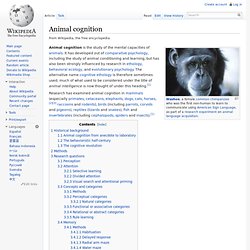

Moments of Animal Genius That Will Amaze You. Proof That Animals Are Getting Smarter. How do animals experience pain? - Robyn J. Crook. Do animals have language? - Michele Bishop. Animal Cognition. CambridgeDeclarationOnConsciousness. This Is How Animals Say Goodbye to the Dead. Do Animals Have Feelings?
Learning to speak: A dog communicates with buttons. When your cat bargains for catnip. Do animals have language? - Michele Bishop. Slime Mold: A Brainless Blob that Seems Smart. A speech pathologist taught her dog Stella to 'speak' What are animals thinking and feeling? Moral behavior in animals. Invertebrate cognition. Cetacean Cognition. Bird cognition. Elephant cognition. Primate cognition. Inter-species friendships. Future - Death rituals in the animal kingdom. When a Jewish person dies, according to tradition, a member of a group called the chevra kadisha stays with the body from death until burial, continually reciting passages from the book of Psalms.

For those in the Catholic church, friends and family members gather together in the presence of the deceased in a ceremony called a wake. Similarly, when ancient Romans died, relatives immediately gathered around the body, reciting lamentations. The body was kept close, in the atrium of the family home, until the funeral procession began. These behaviours transcend cultural boundaries. While the details vary from tradition to tradition, the pattern is undeniable: humans seem to find value in guarding or watching the bodies of the deceased for some period of time following death. Animals Know When They Are Being Treated Unfairly (And They Don’t Like It) Humans beings appear to be hardwired to have a sense of fairness.

The Surprisingly Humanlike Ways Animals Feel Pain. Don't tell someone who just stapled a string of Christmas lights to their hand, but pain can be a good thing.

Oh My God, Fish Can Recognise Human Faces. It’s enough to make this writer seriously consider vegetarianism: A new study has found that fish can recognise human faces.

The paper, published in Scientific Reports, found that archerfish—a tropical species that can shoot water jets from its mouth—could learn to distinguish an image of an individual human’s face from others, even when the pictures were controlled for colour and head shape. Lead author Cait Newport said that the motivation of the work was to better understand how humans recognise faces.
Video shows tool use by a fish. The first video of tool use by a fish has been published in the journal Coral Reefs by Giacomo Bernardi, professor of ecology and evolutionary biology at the University of California, Santa Cruz.

In the video, an orange-dotted tuskfish digs a clam out of the sand, carries it over to a rock, and repeatedly throws the clam against the rock to crush it. Bernardi shot the video in Palau in 2009. "What the movie shows is very interesting. The animal excavates sand to get the shell out, then swims for a long time to find an appropriate area where it can crack the shell," Bernardi said. Scientists Sign Declaration That Animals Have Conscious Awareness; Just Like Humans. Researcher decodes prairie dog language, discovers they've been talking about us (Video) You might not think it to look at them, but prairie dogs and humans actually share an important commonality -- and it's not just their complex social structures, or their habit of standing up on two feet (aww, like people).

As it turns out, prairie dogs actually have one of the most sophisticated forms of vocal communication in the natural world, really not so unlike our own. After more than 25 years of studying the calls of prairie dog in the field, one researcher managed to decode just what these animals are saying. And the results show that praire dogs aren't only extremely effective communicators, they also pay close attention to detail. According to Dr. Koko's not alone: Here are 5 other animals that are almost as smart as humans. You're probably familiar with Koko, the famous gorilla who knows sign language.

Does Koko understand the detailed and complex scientific concepts behind climate change? Probably not. Was her response in a recent video on the topic encouraged, edited, and maybe even scripted? Sure. But who cares? And Koko isn't the only animal to show signs of self-awareness. Obviously we can't look into a living brain to decide if it has a higher consciousness. This is generally referred to as "Theory of Mind" — the ability to recognize the self and empathize with others. This magical button delivers Upworthy stories to you on Facebook: Again, just because an animal possesses Theory of Mind doesn't mean their thought processes are as highfalutin as us self-important human-types.
Here are five more species that act surprisingly human. Intelligent Animals: 10 Animals That Do Crazy-Intelligent Things. Whisper-like behavior in a non-human primate - Morrison - 2013 - Zoo Biology. How Smart Are Dogs? How Smart Are Animals?

PBS Airdate: February 9, 2011 NEIL DEGRASSE TYSON (Astrophysicist, American Museum of Natural History): Hi, I'm Neil deGrasse Tyson, your host of NOVA ScienceNOW, where this season we're asking six big questions. On this episode: How Smart Are Animals? Meet Chaser. Animal cognition. Animal cognition is the study of the mental capacities of animals.

It has developed out of comparative psychology, including the study of animal conditioning and learning, but has also been strongly influenced by research in ethology, behavioral ecology, and evolutionary psychology. The alternative name cognitive ethology is therefore sometimes used; much of what used to be considered under the title of animal intelligence is now thought of under this heading.[1] Research has examined animal cognition in mammals (especially primates, cetaceans, elephants, dogs, cats, horses,[2][3] raccoons and rodents), birds (including parrots, corvids and pigeons), reptiles (lizards and snakes), fish and invertebrates (including cephalopods, spiders and insects).[1] Historical background[edit] Animal cognition from anecdote to laboratory[edit] The behavioristic half-century[edit]